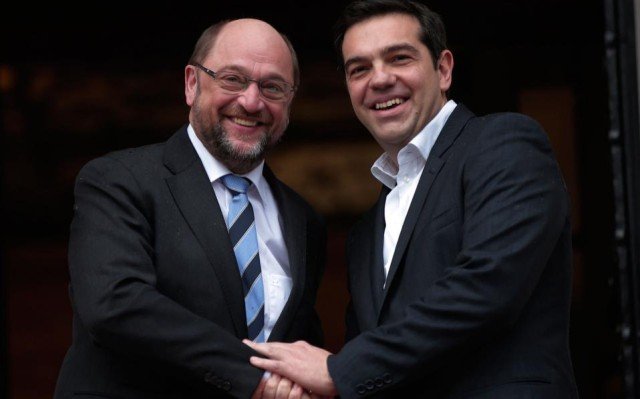Ahead of his visit to Greece, European Parliament President Martin Schulz says he will use “straight talking” in his first meeting with Alexis Tsipras’ government.
Martin Schulz’s visit to Athens comes amid concerns over steps by PM Alexis Tsipras to halt austerity measures.
Greek bank stocks edged back up on January 29 a day after dipping sharply as the government shelved privatization schemes required under bailout terms.
European leaders have insisted Greece must meet its debt obligations.
Alexis Tsipras has said he wants to renegotiate the terms – but insisted there will be no Greek default, which is feared may push Greece out of the eurozone.
Greece has endured tough budget cuts in return for its €240 billion ($270 billion) bailout, negotiated in 2010 with the “troika” – the European Union, International Monetary Fund (IMF) and European Central Bank (ECB).
Its economy has shrunk drastically since the 2008 global financial crisis, and high unemployment has thrown many Greeks into poverty.
Ahead of his visit, the European Parliament president told Germany’s Bild newspaper he would encourage Alexis Tsipras to clamp down on tax evasion in Greece.
However, Martin Schulz he said he would focus on “straight talking” and had “no desire” to debate fiscal plans.
Germany’s Vice-Chancellor Sigmar Gabriel also reiterated the need for Greece to respect the terms of its bailout on Thursday.
Speaking in the German parliament, Economy Minister Sigmar Gabriel said the new Greek government could not expect the rest of Europe to carry what he called their “burden”.
“People must respect the democratic decision of voters and a newly-elected government’s right to decide its course but the rest of Europe’s citizens should not have to expect changes in Greek politics to burden them,” he said.
Jeroen Dijsselbloem, the president of the Eurogroup club of eurozone finance ministers, will visit Athens on January 30.
Ahead of the dignitaries’ trips, European Commission President Jean-Claude Juncker reiterated that cancelling Greece’s huge debt was not an option.
“Greece must comply with Europe,” Jean-Claude Juncker said in an interview with French newspaper Le Figaro on January 29, stressing that “there is no question of cancelling the debt”.
“Arrangements are possible, but they will not fundamentally alter what is in place.”
In his first cabinet meeting since Syriza’s election victory, PM Alexis Tsipras insisted that his country would not default on its debts and vowed to negotiate with creditors over the bailout.
The Athens Stock Exchange fell by 9% in response to Alexis Tsipras’s remarks on January 28 as it emerged that his Syriza-led government was putting on hold major privatization projects, including the port of Piraeus and the main power company, the Public Power Corporation of Greece.
Greek stocks rebounded on January 29, with the National Bank of Greece up 6.7% and Alpha Bank up 11.8%, according to Reuters.
